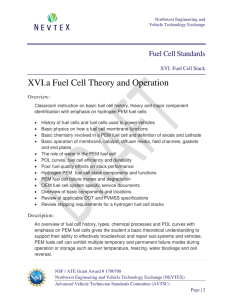Fuel Cell Standards: Fuel Cell Stack Systems

Fuel Cell Standards Curriculum Description:
The Fuel Cell Standards curriculum is provided by the Northwest Engineering and Vehicle Exchange (NEVTEX) and developed by Central Oregon Community College (COCC) and Rio Hondo College (RHC). COCC and RHC worked together "to develop curriculum and training standards for technicians in hybrid electric vehicle (HEV), electric vehicle (EV), and Fuel Cell (FC) vehicle systems." This curriculum was developed with the intention of addressing industry needs by partnering with industrial and educational representatives to obtain input and assistance to develop:
- new approaches to prepare an advanced technologies workforce,
- licensure procedures and policies to ensure the safety of technicians, their employers, and clients, and
- collaboration between educational and industrial partners in the development of new standards and practices.
These standards fulfill an SAE Fuel Cell Systems Certification, which prepares students for interfacing with both high voltage electrical and high-pressure hydrogen systems. The Fuel Cell Standards are broken into seven topics. This section contains the topic Fuel Cell Stack Systems. The other six topics and an Acronym and Definition list are available to view separately.
Fuel Cell Stack Systems Description and Contents:
This section of the standards includes the following documents:
- XVIa Fuel Cell Theory and Operation: This document provides education standards for basic fuel cell theory and major component identification with an emphasis on hydrogen PEM fuel cells. The standard highlights fuel cell history, types, chemical processes, and POL curves.
- XVIb Fuel Cell System Schematics: This document provides education standards for reading and using electrical and mechanical schematics, and then applying that skill for fuel cell stack systems.
- XVIc Constant Voltage Monitoring: This document provides education standards for the operation of stack constant voltage monitoring units, which includes information on the causes and symptoms of voltage changes in OEM systems. A knowledge of causes and symptoms can speed up diagnostics and improve stack repair/replacement decisions.
- XVId ECM and Software for Fuel Cell Systems: This document provides education standards for interfacing with electronic control modules (ECMs), which are responsible for the fuel cell system, high voltage safety layer, and hydrogen safety layer. The standard highlights how the discrete, analog, and digital signals interact between components and controllers for solving vehicle electrical faults.
- XVIe Fuel Cell Propulsion System Overview: This document provides education standards for basic fuel cell vehicle architecture and major component identification with an emphasis on hydrogen PEM fuel cell vehicles.
About this Resource


Comments